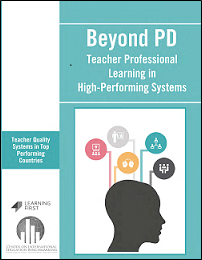Teachers Deserve More Time for Professional Development

I love the work I do: helping teachers develop instructional practices to improve student literacy skills. But sometimes it is frustrating, especially because too often these teachers are not given sufficient support and time for the kind of PD activities that they need in order to truly change their instructional practices. Other fields such as social work and the medical profession require professionals to receive ongoing training that includes job-embedded follow up PD. Why is it that resources, including time, for teacher PD is often an after-thought in many schools and districts? Why is it that funding for PD is the first to be cut, even though we know that having high-quality teachers is the best way to improve student achievement, and that quality PD is the only way to create high-quality teachers?
Last month, EdCentral posted that The National Center on Education and the Economy (NCEE) and Learning First released a report entitled Beyond PD: Teacher Professional Learning in High Performing Systems (2016).
released a report entitled Beyond PD: Teacher Professional Learning in High Performing Systems (2016).
The authors of the report (Jenson, Sonnemann, Roberts-Hull, Hunter) analyzed the professional learning practices of four high-performing international systems (British Columbia, Hong Kong, Shanghai, Singapore) and found the following common to all of them (and, unfortunately, not so common in the U.S.):
- Emphasize the integration of professional learning into teachers’ weekly routines
- Give teachers access to effective professional learning leaders
- Professional development is continuously evaluated for its impact on student learning and instruction
- Teachers receive dedicated time to collaborate with their peers.
They make this summary comment about PD in these countries:
“For all of these teachers, professional learning is central to their jobs. It is not an add-on. It is not something done on Friday afternoons or on a few days at the end of the school year. Teacher professional learning is how they all improve student learning; it is how they improve schools; and it is how they are evaluated on their jobs. They work in systems that are organized around improvement strategies explicitly anchored in teacher professional learning.” (p. 3)
EdCentral notes “By contrast, the United States spends millions on professional development which tends to be ineffective. Even ‘job-embedded’ PD is often reported as low-quality. And teachers typically lack the incentives, structure, and time to learn from their more effective peers.”
This is not the first report to compare teacher PD in the U.S. with other countries or to note that much of PD in this country is not based at all on what research tells us is effective PD. The National Staff Development Council Report Professional Learning in the Learning Profession (Wei et al., 2009) identified the following six components that should be in place for PD to be effective:
- PD must be sustained and intense, including a substantial number of contact hours spread out over multiple months
- School-based peer coaching must be available that includes ongoing classroom modeling and observation, supportive critiques of practice, facilitated opportunities for teachers to share with their peers
- PD is more effective when it is a coherent part of school reform plans rather than one-shot workshops
- PD should focus on the concrete tasks of teaching rather than abstract discussions of teaching or educational theory
- Teacher training should be active, including modeling the sought after practices and constructing opportunities for teachers to practice and reflect on new teaching strategies
- Opportunities for peer observation, which can include the use of videos, are helpful
Links to other resources related to effective PD are provided in two earlier Literacy Lines posts:
My hope is that educators who are reading this post will use the findings in these reports to help convince administrators in their schools that supporting the kind of PD activities that are the norm in high-performing systems, such as British Columbia and Singapore, are worth doing in the U.S.!

 Joan Sedita is the founder of Keys to Literacy and author of the Keys to Literacy professional development programs. She is an experienced educator, nationally recognized speaker and teacher trainer. She has worked for over 35 years in the literacy education field and has presented to thousands of teachers and related professionals at schools, colleges, clinics, and professional conferences.
Joan Sedita is the founder of Keys to Literacy and author of the Keys to Literacy professional development programs. She is an experienced educator, nationally recognized speaker and teacher trainer. She has worked for over 35 years in the literacy education field and has presented to thousands of teachers and related professionals at schools, colleges, clinics, and professional conferences.
Leave a Reply